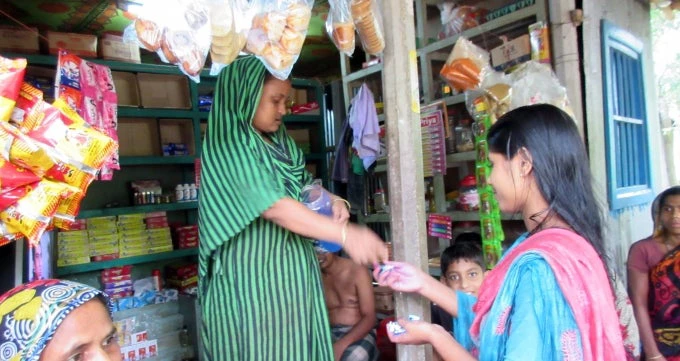
How does a poor woman in rural Bangladesh make use of her business acumen if she lacks education, lacks opportunities to learn new skills, no assets of her own, a husband who earns just enough for the family to survive from day to day, children to look after and a society that had traditionally disapproved of women working outside the home?
The story of Hafiza Begum offers one answer. We interviewed her as part of our on-going research in Bangladesh, which sets out to understand its female labor force participation rates. This phenomenon of lower than expected female labor force participation appears to characterize the wider South Asia and MENA regions, despite their positive growth rates. What are some of the reasons?
Hafiza was born into a family too poor to educate her and she was married off at an early age. Her husband worked for daily wages wherever he could find it. Their two young daughters went to school in the local madrassa because it was free. She emerged from our interview as a woman who was determined, within the social norms of her society, to combine caring for her family with finding the resources she needed to build up her own business.
She told her husband early in their marriage how she planned to do this. “Suppose you buy me a kilogram of onions to cook our meals with. If I use 2 onions in a meal, you won’t be able to tell. Even if I use half an onion for a meal, you still won’t be any the wiser. Yet if I use just half an onion every time I cook, our supply of onions will last longer and we will save money.”
This thrifty attitude had been the hallmark of her housekeeping throughout her marriage. She boasted to us that when her husband recently went away to work in a brickfield, she managed to save Rs.400 out of the Rs.500 he gave her to run the house. How did she do it? She went to the marshes near their house to catch fish, keeping some to eat and selling the rest to her neighbors. She supplemented the vegetables she planted on their homestead plot with edible greens that grew wild near their house. She spent money only on what she could not produce herself.
Her contributions helped her husband to start saving. They pooled their funds to lease a small piece of land near their home. While he planted the paddy, she worked alongside him to weed and harvest the crop. This was a break from past traditions when not only were women forbidden to work outside the home, they were expressly forbidden to work in the paddy fields. Her participation meant that they were able to save money that would otherwise have gone on hiring labor. She had to listen to criticism from her mother-in-law and neighbors for going against tradition, but she put up with it to secure her family’s future.
Hafiza’s experience raises some important points for the women’s empowerment agenda: First, it reminds that while current feminist analysis of women's unpaid work in the Global North is primarily focused on their unpaid care work, many women in low-income countries also engage in unpaid productive work, contributing directly to consumption (gathering wild greens) or saving on costs (substituting for hired labor). Second, it draws attention to the multiple constraints that these women face. There is now evidence from different parts of the world that poor women entrepreneurs need coordinated support on a variety of different fronts if they are to transform subsistence businesses into sustainable livelihoods. Someone like Hafiza for instance, would have benefited from business training, graduation to larger loans and pro-active livestock extension services.
Finally, it draws attention to the chicken-and-egg problem of social norms. Such norms have not prevented Hafiza from working in the field, but they have discouraged her from taking her produce to highly male-dominated marketplaces that feel hostile to women. The effect of this is that markets continue to be reproduced as male-dominated spaces which most women prefer to avoid. The constraint on women’s ability to market their own goods can be seen as symptomatic of the wider set of constraints that curtail their economic agency more generally.
Tackling the male-dominated culture of the market place by supporting a critical mass of women to start trading in their own right might therefore be seen as an important step in tackling these more resilient constraints.



Join the Conversation